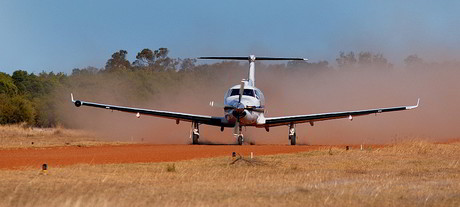Outback radio is a lifesaver

From pedal power to modern HF, the Royal Flying Doctor Service has long relied on radio to help it provide essential medical care.
The National Wine Centre was once again the venue for the annual Adelaide ARCIA networking dinner on Thursday, 4 October 2018, with more than 60 people taking the opportunity to network with their peers and colleagues at one of Adelaide’s premier venues. But a highlight of the event was an outline of the long-standing link between the radiocommunications industry and the Royal Flying Doctor Service (RFDS), which provides medical and associated health services to the population in remote areas of Australia. The radiocommunications industry in South Australia has a long and interesting history of support for and engagement with the RFDS.
Back in the early 20th century, the Reverend Dr John Flynn worked with settlers in outback Australia on behalf of his church. One of the concerns he had was that people on remote properties had little or no real medical support available to them; road travel to the nearest medical facilities could often take days. Flynn had a vision of providing a service to these remote locations using aircraft, and in 1928 the pre-cursor to the RFDS was founded in Cloncurry in Queensland, with one plane on loan from the fledgling Queensland and Northern Territory Aerial Services (now Qantas). Back in those days the medical service had a patient contact rate of three patients every two days.
Having started the service, Flynn then realised that the next problem was providing a means for people in these remote locations to summon the air ambulance or seek advice for urgent medical situations. Flynn contacted Alf Traeger in Adelaide and outlined the problem. HF radio obviously was a solution, but most of the remote locations did not have reliable electric power. So Traeger designed the ‘pedal wireless’ — a set of bicycle pedals connected to a generator — which the operator would use to power the radio. Suddenly, there was a viable solution to the tyranny of distance.

Comms connections
At the Adelaide dinner, Alf Traeger’s daughter, Anne Smallwood, gave an interesting talk on her memories of her father’s development of the pedal wireless and its relationship with the RFDS. It was very interesting to learn about the development of this ‘wireless solution’ and the part it played in opening up the outback. It also appears that Alf was well ahead of his time in many ways as he was also looking at developing desalination plants to turn salt water into fresh water, plus other climate-related inventions.
Anthea Rice from the Adelaide-based RFDS Central Division (which serves South Australia and the Northern Territory) gave an outline of the development of the RFDS’s unique and much-valued medical support service and the importance of the radiocommunications in its development. Once RFDS medical staff were able to communicate directly with remote locations, a system of ‘medical chests’ was set up at the remote locations. The radio operators could be directed by RFDS doctors to take a medicine or piece of equipment from the chest and apply it to the patient. The medical chest solution is still operating in some of the more remote settlements, enabling patients to be stabilised while the RFDS support staff are in transit.

In the early days, landing strips were often simply open paddocks or sections of straight roads, so the pilots became very experienced at negotiating the perils of ‘bush flying’ — from rogue cattle and wild kangaroos, to the lack of lighting at virtually every landing site. From the days of a single aircraft, the RFDS has now grown to 69 aircraft and more than 300,000 patient contacts every year. There is no doubt that as far as modern paramedical services go, the RFDS services one of the largest operational areas in the world.
Interestingly, Anthea mentioned that by far the largest number of clients they have each year come from metropolitan postcode areas — so be good to the RFDS, as it might one day be called to support you or your loved ones.
A vital service
From an industry point of view, there are still links to the pedal wireless and Alf Traeger. Justin Salisbury of CRS Accessories/ComWide Services in Adelaide is Alf Traeger’s grandson, and therefore continues the Traeger family link with wireless communications. In addition, Adelaide-based HF radio manufacturer Codan Radio Communications celebrated its 60th anniversary in 2018; the company was founded on manufacturing and supplying transceivers for the RFDS network. Even today, the bulk of the fixed HF radio equipment used by the RFDS is manufactured by Codan.
At the final stage of the dinner, each table was encouraged to make a donation, with the highest total — provided by CSE Tetracom — rewarded with a twin-pack of wine provided by the National Wine Centre. This fundraising effort generated close to $1400, which was donated to the RFDS.
ARCIA is very proud to be associated with the RFDS, even in such a small way, as we recognise that thousands of people have been touched by the RFDS over the 90-odd years of its operation.
You can read our detailed account of Alf Traeger and his radio equipment at https://bit.ly/2SyG47L.
Please follow us and share on Twitter and Facebook. You can also subscribe for FREE to our weekly newsletter and bimonthly magazine.
Why traditional transformation approaches fail field workers
A critical misstep in traditional transformation strategies is failing to understand the...
RFUANZ report: setting the frequency for success in 2025
Last year brought a lot of internal change for RFUANZ, but the association has hit the ground...
ARCIA update: an extended event calendar for 2025
With the addition of Tasmanian events and a conference in Adelaide in September, 2025 will see...





